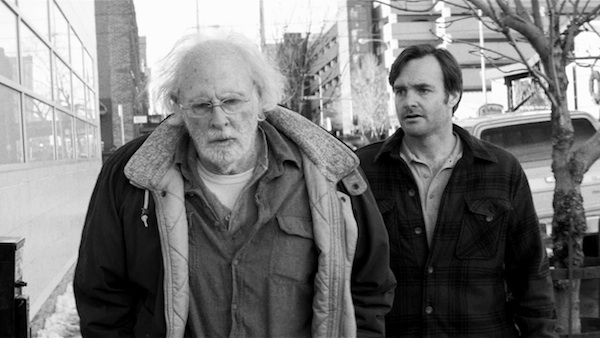I wish I had time to see Nebraska again, but with RiverRun screeners (!) and other movies opening, I don’t right now.
Still, the conversation is ongoing.
Mark: I thought the film was hard on the Midwest.
Me: This never occurred to me. Could it be because I’ve become used to films depicting the South and most rural spaces (so often) with little understanding or nuance? That used to rankle greatly because of my rural, North Carolina roots, but apparently I’ve become desensitized.
Mitch: Stopping off in the hometown did not work for me. It seemed too contrived and too convenient.
Me: Huh? Never occurred to me that this was a problem when watching the film or thinking about it afterward. If circumstances dictate that you need a port in a storm, isn’t someplace familiar where you have roots the likeliest choice? Even if it is an unpleasant place rife with bad memories, a place you left and have seldom chosen to visit, it is still easier to retreat to the known entity to regroup than to go somewhere new, especially when you have few resources.
Jennie: (excerpted comment on the original blog post) I liked it but I found myself very bored. And I really wanted to l like it. It was also very MALE.
Me: (my partial answer to the comment) Interesting. It seemed very rural rather than very male to me. I saw it as a double feature with The Wolf of Wall Street, which is VERY MALE in all the worst ways without a counterbalance of any sort.
Curiously, I found myself thinking a lot of Frances Ha in connection with Nebraska. As unlikely as the comparison might appear at first, the films seem like bookends to me: one female the other male, one urban hipster one rural everyman, one searching character and the other sort of settled but both gentle souls brimming with grace on rambling personal journeys marked by occasional, small insights. Mainly, both Frances and David are kind characters even if a bit downtrodden. And, of course, both films are shot in black and white.
David: The entire film is built on a series of lies.
Me: Wow.
This critique catapulted me into a new way of thinking about the film. My friend David is surely right in his assessment, and if you have a way of looking at the world where things are clearly good or bad and people make choices that are solidly right or wrong, then there is no way around this reading of Nebraska.
But, while I see the truth in David’s assessment, that’s not the world where I live.
Have you ever read the Zen stories “Maybe” or “Is That So?” Or, do you remember the parables of Jesus? For me, choices exist on a continuum where the poles are a lot clearer than the muddied middle, which is not often so clearly good or bad or right or wrong, especially when I am looking outwardly at other people. Looking outward, I realize that I have a partial vision and try to avoid judgments because value systems are often in conflict.
I live in a world marked by paradox, and competing ideas and complexity are part of the terrain.
And, besides, no one is perfect.
What holds it all together? Sometimes the competing ideas co-exist quite easily inside my head. Other times, I rely heavily on grace, forgiveness, and being measured in the judgments I make.
This brings me back to Nebraska and the character of David Grant (Will Forte) who takes his father Woody (Bruce Dern) on a road trip from Montana to Nebraska to a sweepstakes headquarters. Woody has received a letter that makes him believe he has won a million dollars, which everyone around him knows is not real.
Woody is an alcoholic who doesn’t think clearly, and he’s not such a nice guy. But, his son David goes with him on the trip largely to give his father a shred of dignity at the end of his life.
David is not perfect. He resorts to a childish prank, predicated on making people who have belittled and taken advantage of his father think that he may have won some money after all. Is it a mature choice? No. Does it make Woody a better person? No. Is it an outright lie? I’m not sure. That’s where seeing the movie again would come in handy.
But, does that matter to me? I don’t think so.
For me, this is David’s story, not Woody’s story, and David is patient, kind, gentle, forgiving, and growing in grace.
I also have to say, to go back to Jennie’s comment, that what I like most about David Grant may be the balance he strikes as a man who is defined by, and apparently comfortable with, traits that we often associate with the feminine.
So, Mark, Mitch, Jennie, and David are all astute viewers who offer compelling insights and arguments about meaning framed by their own experiences and perspectives. I see a somewhat different film based on my own.
Let the conversation continue…
